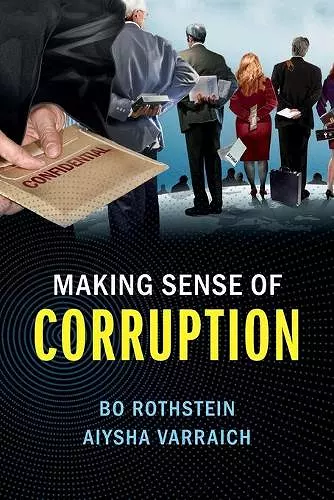Making Sense of Corruption
Bo Rothstein author Aiysha Varraich author
Format:Paperback
Publisher:Cambridge University Press
Published:27th Feb '17
Currently unavailable, and unfortunately no date known when it will be back
This paperback is available in another edition too:
- Hardback£41.40was £46.00(9781107163706)

This book provides a systematic analysis of how the understanding of corruption has evolved and pinpoints what constitutes corruption.
From being largely ignored in research, corruption has recently become one of the most important social issues. Yet defining corruption has resulted in profound disagreement. This book presents a bold and innovative solution to this problem, which will appeal to students of political theory, political philosophy, sociology and social anthropology.Corruption is a serious threat to prosperity, democracy and human well-being, with mounting empirical evidence highlighting its detrimental effects on society. Yet defining this threat has resulted in profound disagreement, producing a multidimensional concept. Tackling this important and provocative topic, the authors provide an accessible and systematic analysis of how our understanding of corruption has evolved. They identify gaps in the research and make connections between related concepts such as clientelism, patronage, patrimonialism, particularism and state capture. A fundamental issue discussed is how the opposite of corruption should be defined. By arguing for the possibility of a universal understanding of corruption, and specifically what corruption is not, an innovative solution to this problem is presented. This book provides an accessible overview of corruption, allowing scholars and students alike to see the far reaching place it has within academic research.
'At a time when the anti-corruption movement is in need of critical self-assessment, Rothstein and Varraich offer an important analysis. We know we do not want corruption - but what do we want? Can we, and should we, disentangle corruption from the many other related difficulties undermining the well-being of people and societies in many parts of the world? How do we know where corruption is worst, and whether our reforms are helping, hurting, or having any effects at all? Scholars and policy makers alike will find the insights offered by Rothstein and Varraich essential as their anti-corruption work enters new phases.' Michael Johnston, Colgate University, New York
'Defining the core issue as one of the quality of government and the idea that a non-corrupt government is 'based on the principle of impartiality in the exercise of public power,' [Rothstein and Varraich] relate the theory of corruption to real world problems. This is a small book, dense in its coverage of issues of philosophy, sociology, and political science, but it will probably cause anyone who has glibly used the term to have second thoughts and, hopefully, rethink their core assumptions.' E. V. Schneier, CHOICE
ISBN: 9781316615270
Dimensions: 225mm x 150mm x 9mm
Weight: 310g
184 pages